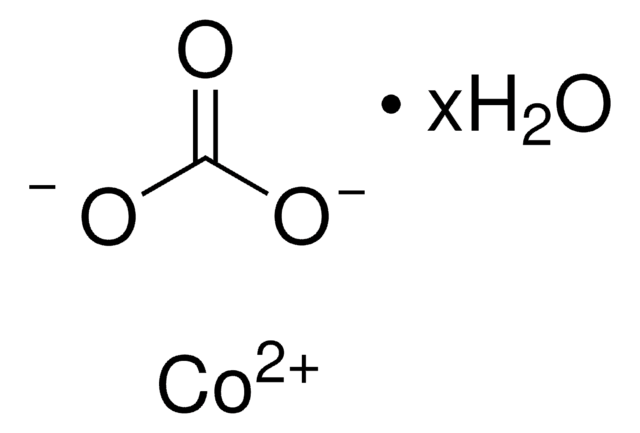544183
Nickel carbonate, basic hydrate
99.9% trace metals basis
Synonym(s):
Nickel carbonate hydroxide hydrate, Nickel(II) carbonate (basic) hydrate
About This Item
Recommended Products
Quality Level
Assay
99.9% (trace metals analysis)
99.9% trace metals basis
form
powder
reaction suitability
reagent type: catalyst
core: nickel
impurities
≤1500.0 ppm Trace Metal Analysis
application(s)
battery manufacturing
SMILES string
O.[Ni++].O[Ni]O.O[Ni]O.[O-]C([O-])=O
InChI
1S/CH2O3.3Ni.5H2O/c2-1(3)4;;;;;;;;/h(H2,2,3,4);;;;5*1H2/q;3*+2;;;;;/p-6
InChI key
CCFAFYHXJQHIRV-UHFFFAOYSA-H
Looking for similar products? Visit Product Comparison Guide
General description
Application
- To synthesize spinel nickel cobaltite (NiCo2O4) nanoparticles for supercapacitor application.
- To prepare nanocrystalline nickel disulfide via the solid-state reaction.
Signal Word
Danger
Hazard Statements
Precautionary Statements
Hazard Classifications
Acute Tox. 4 Inhalation - Acute Tox. 4 Oral - Aquatic Acute 1 - Aquatic Chronic 1 - Carc. 1B - Muta. 2 - Repr. 1B - Resp. Sens. 1 - Skin Irrit. 2 - Skin Sens. 1 - STOT RE 1 Inhalation
Storage Class Code
6.1C - Combustible acute toxic Cat.3 / toxic compounds or compounds which causing chronic effects
WGK
WGK 3
Personal Protective Equipment
Choose from one of the most recent versions:
Already Own This Product?
Find documentation for the products that you have recently purchased in the Document Library.
Customers Also Viewed
Articles
Advances in materials have often been led by the development of new synthetic methods that provide control over size, morphology and structure.
Lithium-ion batteries represent a group of electrochemical devices used for electricity storage and have attracted a lot of attention in the past two decades due to their portability, rechargeability and low cost.
Advances in materials have often been led by the development of new synthetic methods that provide control over size, morphology and structure. The preparation of materials in a scalable and continuous manner is critical when development moves beyond lab-scale quantities.
The prevailing strategies for heat and electric-power production that rely on fossil and fission fuels are having a negative impact on the environment and on our living conditions.
Our team of scientists has experience in all areas of research including Life Science, Material Science, Chemical Synthesis, Chromatography, Analytical and many others.
Contact Technical Service















